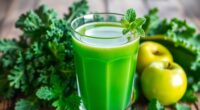When comparing organic and conventional juices, remember that organic options often pack more nutrients and antioxidants, thanks to healthier farming practices. They're also better for the environment, promoting soil health and reducing pollution. While organic juices may cost more, many swear by the superior taste and health benefits. You'll find they're free from GMOs and chemicals too. Curious about how these differences impact your choices? There's plenty more to explore about organic juices' advantages!
Key Takeaways
- Organic juices often contain higher levels of essential nutrients and antioxidants compared to conventional juices, enhancing health benefits.
- The absence of synthetic chemicals in organic farming leads to better nutrient retention and lower nitrate levels in juices.
- Choosing organic supports sustainable practices, reducing environmental impact and promoting biodiversity in farming.
- While organic juices typically cost more, many consumers believe the health benefits justify the expense.
- Taste preferences can vary, but organic juices are often noted for their richer flavors due to higher nutrient content and production methods.
Nutritional Content: What Sets Organic Juices Apart
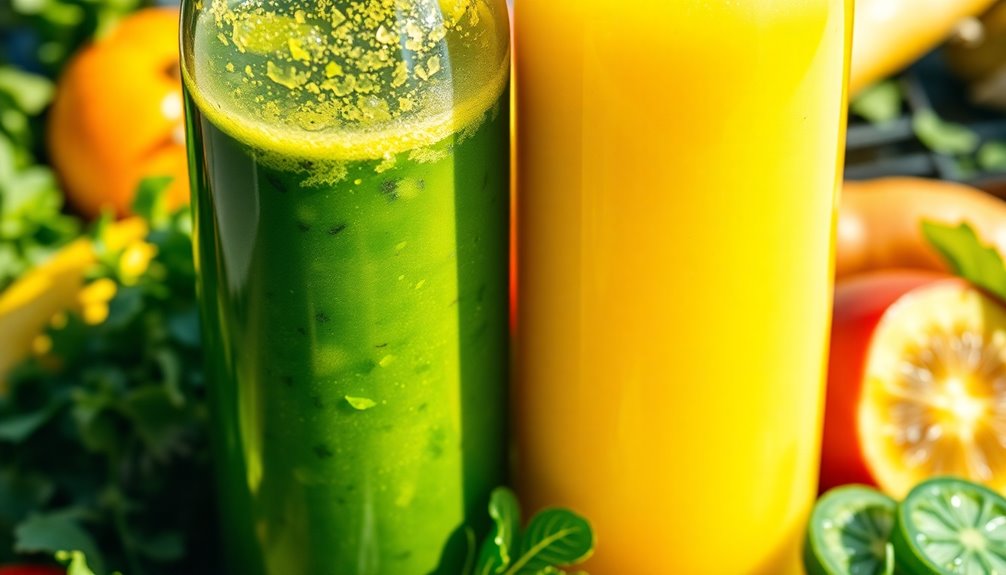
When you compare organic juices to their conventional counterparts, you'll often find that organic options pack in more essential nutrients and antioxidants.
Organic juices typically have higher soluble solids content in fruits like blackcurrant and beetroot, making them richer in flavor and nutrition. The absence of synthetic chemicals in organic farming helps enhance nutrient retention, leading to lower nitrate levels in vegetable juices. Additionally, organic blackcurrant juice has a higher soluble solids content of 14.9% compared to conventional options, further showcasing its nutritional superiority. The dietary fiber found in organic juices can also promote better digestive health.
You'll also notice that organic juices usually boast slightly higher antioxidant activity, contributing to better overall health by reducing oxidative stress. Furthermore, organic produce is less likely to contain pesticide residues that can disrupt antioxidant function.
With organic juices, you're not just getting similar vitamin and mineral content; you're also enjoying a more wholesome, naturally preserved option.
Environmental Benefits of Choosing Organic
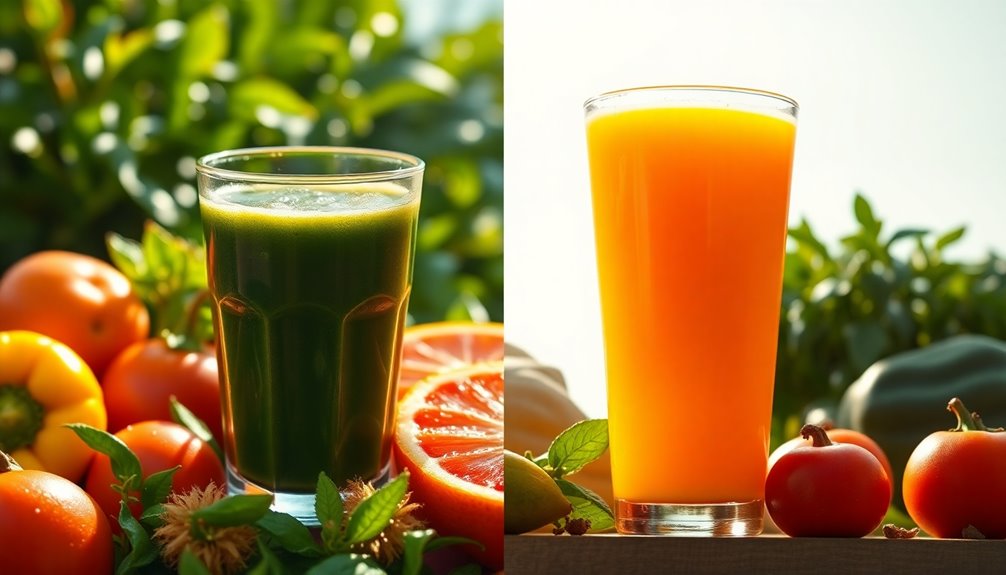
Choosing organic juices not only benefits your health but also supports the environment in significant ways.
By opting for organic, you reduce the need for synthetic pesticides and fertilizers that can pollute our soil and water. Organic farming promotes soil conservation, biodiversity, and water preservation, contributing to a healthier ecosystem. Choosing organic juices also ensures that you are consuming products made from higher nutritional value produce, which further supports environmental sustainability.
You'll also support local and small-scale farmers committed to sustainable practices. Organic methods enhance soil quality, reduce erosion, and improve nutrient retention.
Plus, they conserve water through efficient irrigation systems and crop rotation, fostering diverse ecosystems.
Health Considerations: Why Organic Matters
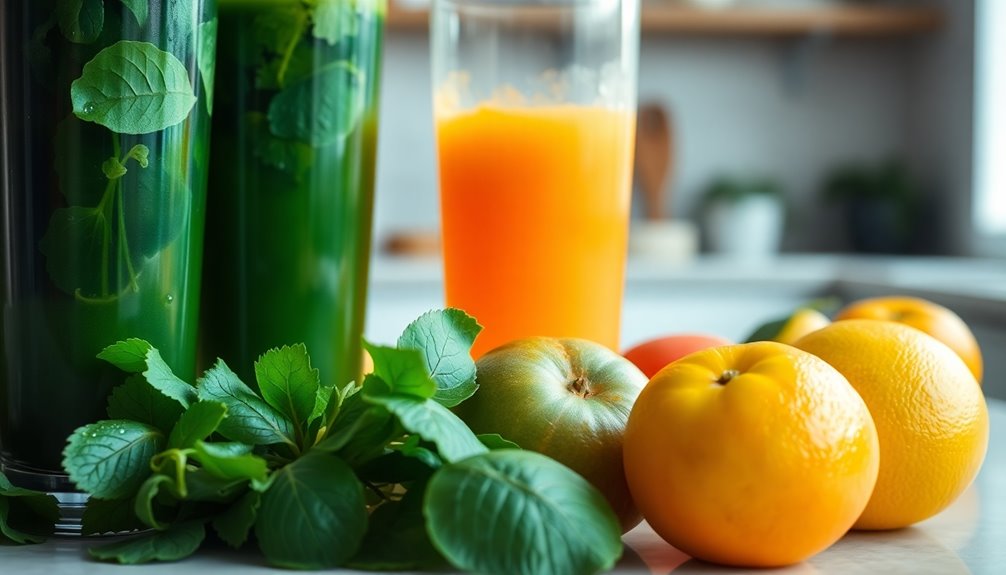
Organic juices offer a wealth of health benefits that can significantly enhance your overall well-being.
They're packed with essential vitamins, minerals, and antioxidants, often containing higher antioxidant levels than conventional options. This nutrient density provides a concentrated dose of vital nutrients, supporting your immune system and helping prevent chronic diseases. Additionally, organic farming prohibits the use of GMO seeds, which can contribute to a more natural product. Antioxidants present in organic juices also help combat oxidative stress, promoting overall health.
With high vitamin C content, organic juices boost immune function and promote healthy skin.
Their fiber content aids digestion and promotes regularity, while their high water content keeps you hydrated.
Plus, by being free from synthetic pesticides and fertilizers, these juices reduce the risk of digestive issues.
Regularly enjoying organic juices can help curb unhealthy cravings and support your body's detoxification processes, making them a smart choice for a balanced diet.
Cost Analysis: Is Organic Worth the Investment?

Is it really worth investing in organic juices, given their higher price tags? The answer depends on your priorities.
Organic juices typically cost more due to higher production and certification expenses. However, many consumers believe the health benefits justify the extra expense. If you're concerned about nutrition and environmental impact, the investment may be worth it. Additionally, organic juices contain higher levels of nutrients compared to conventional options, further supporting their value. Organic options are often associated with reduced pesticide exposure, which can be a significant advantage for health-conscious consumers.
Keep in mind that prices can vary based on market conditions. While organic options are often pricier, making your own juice at home can save you money in the long run.
If you're on a tight budget, conventional juices might be more suitable. Ultimately, the decision hinges on your health goals and financial situation.
Taste Test: The Flavor Profile of Organic vs. Conventional

While many people associate organic juices with superior flavor, the reality is more nuanced. Some consumers perceive organic juices as tasting better due to the absence of synthetic chemicals and preservatives. However, mixed research findings show that taste differences can vary significantly depending on the specific juice type. Your personal biases and expectations also play a crucial role in how you perceive flavors. Empirical studies suggest organic juices often boast higher nutrient levels and enhanced flavor profiles, thanks to organic acids and cold-pressing methods. Additionally, sustainable farming practices contribute to richer, cleaner produce. Ultimately, your taste preferences will determine whether you lean towards organic or conventional juices, reflecting your dietary goals and values.
Understanding Organic Certification and Its Importance
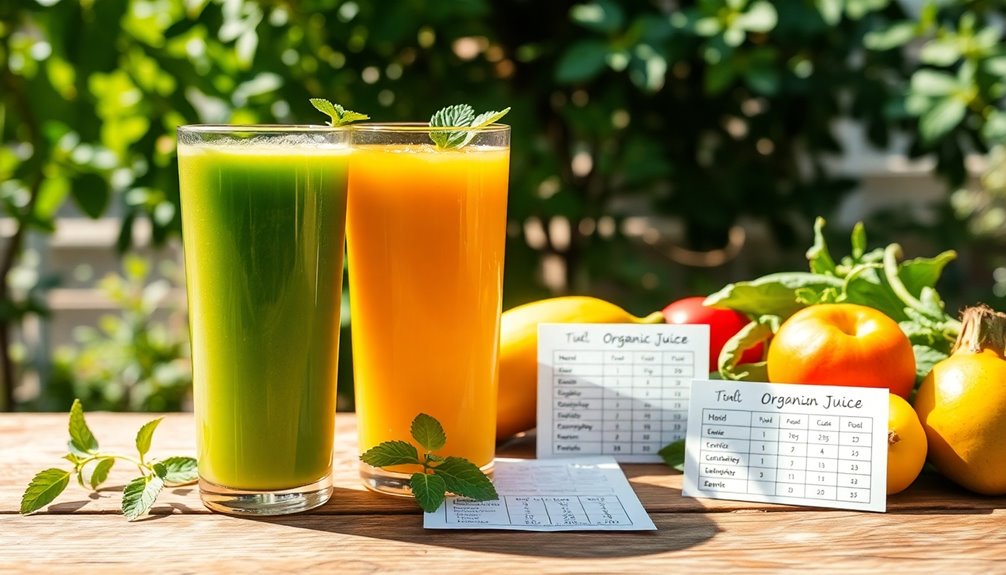
When you choose organic products, you're not just opting for a different farming method; you're investing in a system that prioritizes sustainability and consumer safety.
Organic certification verifies that farms and facilities comply with strict organic standards, excluding synthetic chemicals and GMOs. This process involves creating an organic system plan, passing inspections, and adhering to varying regulations based on your country. Additionally, third-party certification ensures that farms maintain necessary compliance and undergo regular inspections to uphold their organic status.
By supporting certified organic products, you're ensuring you receive items free from harmful substances, enhancing your health and contributing to lower environmental impact.
Additionally, organic certification fosters consumer confidence, meets growing market demand, and ensures compliance with regulatory requirements.
This commitment to quality not only benefits you but also supports a more sustainable agricultural system.
Frequently Asked Questions
How Can I Identify Truly Organic Juice Brands?
To identify truly organic juice brands, look for the USDA Organic label, which guarantees compliance with strict organic standards.
Check the ingredient list to ensure all components are organic.
Trust well-known brands that prioritize organic farming practices and consider local producers for authenticity.
Are There Any Organic Juice Recipes I Can Try at Home?
Absolutely! You can try some delicious organic juice recipes at home.
Start with a refreshing Beet Apple Juice by blending beets, apples, and lemon.
For a fruity twist, mix white grapes, kiwi, strawberries, and lemon for Berry Lemon Juice.
If you're looking for a vitamin boost, combine carrots, pineapple, and orange.
Don't forget a nutrient-packed Green Juice with kale, celery, and ginger!
Enjoy experimenting with these vibrant flavors!
What Storage Tips Maximize the Shelf Life of Organic Juices?
Want to keep your organic juices fresh as long as possible? Start by using airtight glass containers to minimize oxygen exposure.
Store them in your fridge at a consistent temperature between 35-40°F, avoiding the door shelves.
For long-term storage, freeze juices in airtight containers, labeling them with dates.
Always inspect your juice for spoilage signs before drinking.
Follow these tips, and you'll savor the vibrant flavors of your organic juices longer!
Can Organic Juices Be Used in Cooking or Baking?
Yes, you can definitely use organic juices in both cooking and baking! They enhance flavors, add nutritional value, and can replace water or milk in recipes.
In baking, organic juices can intensify taste and improve moisture. In cooking, they enrich broths, boost dressings, and create unique sauces.
Just remember to adjust for acidity as needed. By incorporating organic juices, you're also supporting sustainable practices, which is a win for both you and the environment!
How Do Organic Juices Affect the Environment Beyond Farming Practices?
Organic juices positively impact the environment beyond farming practices.
When you choose organic, you're supporting sustainable production methods that often use recyclable packaging and renewable energy. These choices lead to reduced pollution and less waste.
By opting for organic, you also encourage local sourcing, which cuts down transportation emissions.
Conclusion
In the great debate of organic versus conventional juice, you hold the power to choose wisely. By weighing nutritional content, environmental impact, health benefits, and flavor, you're not just sipping juice; you're crafting a lifestyle. Remember, even a single drop of organic juice can create ripples in your health and the planet's future. So, as you raise your glass, consider the story behind each sip—your choice might just be the key to a brighter tomorrow. Cheers!
Cindy thoroughly researches juicing trends, techniques, and recipes to provide readers with practical advice and inspiration. Her writing style is accessible, engaging, and designed to make complex concepts easy to understand. Cindy’s dedication to promoting the advantages of juicing shines through her work, empowering readers to make positive changes in their lives through the simple act of juicing.


